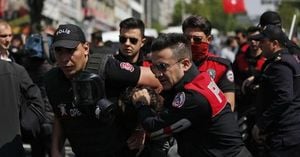The Helsinki District Court has sentenced 38-year-old Russian citizen Voislav Torden, previously known as Yan Petrovsky, to life imprisonment for war crimes committed during the Ukraine conflict from 2014 to 2015. Recognized as one of the prominent commanders of the neo-Nazi group Rusich, Torden’s conviction marks a significant milestone as it is the first case of such charges being processed by Finnish judicial systems concerning actions undertaken on Ukrainian soil.
On March 14, 2025, Torden was found guilty on four counts out of five for his role in the heinous acts alongside his group, which was heavily involved with Russian separatists during the conflict. His crimes included the ambush of Ukrainian soldiers, the killing of 22 members of the Armed Forces of Ukraine (AFU), and violations of the established laws of warfare, including treating prisoners and the deceased unethically.
The prosecutor's office had initially sought to convict Torden on five counts, yet the court dismissed one due to insufficient evidence. This decision was based on the complexity of locating exact culpability amid multiple groups involved at the time of the ambush. Yet Torden's direct involvement leading to the deaths and subsequent maltreatment of the wounded soldiers remained uncontested.
Evidence presented at the trial encapsulated multiple video recordings and expert testimony which illustrated Torden’s actions, including directing fire during the ambush and filming propaganda materials of the events, actions which he later tried to downplay during the trial. According to his lawyer, Natalia Malgina, he denied all wrongdoing, asserting, "Torden was sentenced to life imprisonment," emphasizing the political dimensions attributed to his prosecution.
Notably, Torden’s connection to Rusich and its founder Alexey Milchakov, both infamous for their radical ideologies and participation in violent activities, linked him firmly to the war crimes committed. The group was known to have operated under brutality, completing acts infamous for their cruelty against opposition soldiers.
Legal restrictions had complicated the situation significantly; Finland’s Supreme Court had previously denied Ukraine’s request for extradition. The court cited concerns over human rights violations, highlighting poor prison conditions known to conflict with the European Convention on Human Rights, which prohibits torture and degrading treatment. During these proceedings, Torden expressed his desire for political asylum.
During the trial, the Finnish court found clear corroboration of Torden’s actions. "This was the first case when charges were brought in Finland for war crimes allegedly committed on the territory of Ukraine," stated reports from YLE, showcasing the trial's significance within international law and the precedent it sets.
The charges against Torden included heinous acts such as allowing his troops to mock and abuse the injured and photograph the dead soldiers, conveying threats on social media against potential captives, proving his involvement extended beyond mere combat duties. Witness statements brought forth evidence asserting the psychological warfare tactics employed by Torden and his associates.
Opposing counsel labeled the proceedings as politically motivated, claiming bias against Torden, who had previously faced expulsion from Norway over security concerns before being granted residency rights within Finland, following his wife’s educational pursuits.
Despite his claims of innocence, including statements positing he was merely filming propaganda films, the court found Torden’s actions reflective of orders expected from commanders within combat situations, binding him within the confines of culpability for his actions.
Going forward, the Finnish ruling could embolden other nations to take similar actions against individuals accused of war crimes linked to conflicts abroad. Such developments suggest the potential for increased accountability and stricter examinations of war conduct under international law.
The ramifications of this trial may extend beyond Finland, spotlighting the need for universally recognized principles surrounding the treatment of prisoners of war and the moral responsibilities of military leaders. The legal precedents being established here could frame discussions on accountability at international forums, particularly as more war crimes trials emerge from the Ukrainian crisis and beyond.



